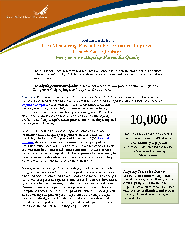The Patient Protection and Affordable Care Act of 2010 ("the health care reform law") required the Centers for Medicare and Medicaid Services (CMS) to expand its Physician Directory tool. CMS launched Physician Compare in December 2010 to offer Americans a national directory where they can find information on physicians, including address, contact information, medical specialty and gender. The website also provides information on whether doctors have foreign language proficiencies, if they accept Medicare patients, and where they completed their degrees and training.
This new brief from the Robert Wood Johnson Foundation highlights examples of public reporting websites that have caused hospitals and physicians to improve their practice patterns and the quality of care they provide.
The Wisconsin Collaborative for Healthcare Quality, which leads the Aligning Forces for Quality (AF4Q) effort in Wisconsin, saw that organizations that participated in its public reporting initiative outperformed those that did not participate. The brief found similar results in nearby states and throughout the country. In Wisconsin, 62.3 percent of patients with diabetes who received care from practices that publicly report data got the recommended blood sugar tests, eye exams and lipids tests, compared to 58.1 percent of patients who received care in other practices. In other AF4Q communities, public reporting has motivated practices to remind patients to receive needed tests to control their chronic conditions.
As part of the Patient Protection and Affordable Care Act of 2010, Physician Compare will expand to include quality data in 2013. CMS also recently proposed a rule to allow organizations to obtain its quality and cost data for creating localized public reports on health care quality.


